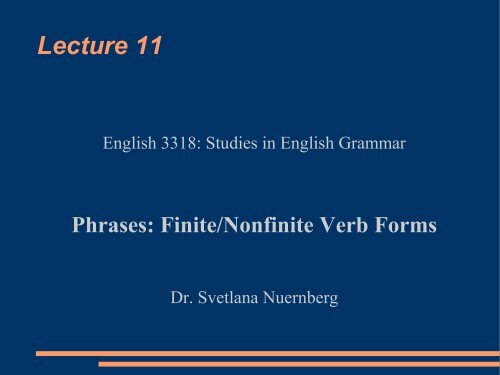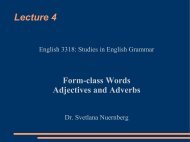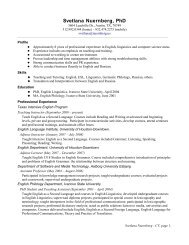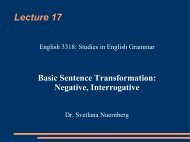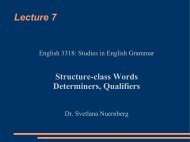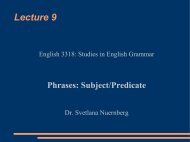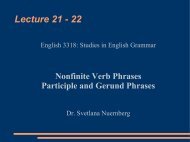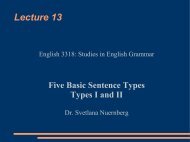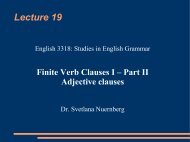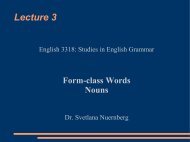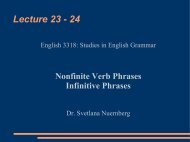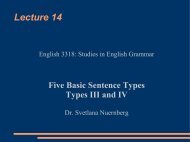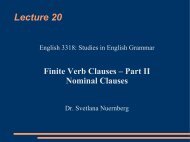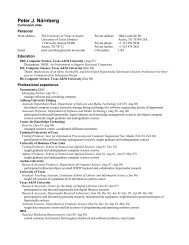English 3318
English 3318
English 3318
- No tags were found...
Create successful ePaper yourself
Turn your PDF publications into a flip-book with our unique Google optimized e-Paper software.
Present and Past Tenses with HAVE●The main verb with phrase with helping verb HAVE asa constituent of the auxiliary– since have comes immediately after TENSE it will inflect forpresent or past (have/has) or (had)MVPMVPAUXAUXMVTENSE HAVE + {-en} TENSE HAVE + {-en}MVpresent gopast gohave/has gonehad gone
Present and Past Tenses withHAVE and BEMVPAUXMVTENSE HAVE + {-EN} BE + {-ING}presentpastgopresent – have/has been goingpast – had been going
Time, Tense and Aspect●●●The distinction between form and function– help to understand how <strong>English</strong> verbs signal time,tense ans aspect●●form – physical shape or configuration of a grammatical unitfunction – the role it plays in a larger grammatical structureMain verb phrase contain tense morphemes– help to signal the time when an action took place– time ≠tense (not always match)●●the inflection of the verb identify its tense: past and presenttime (present, past, future) referred to is often determined byother elements in the sentences ( especially adverbs)Aspect of the verb– single or repeated occurrence– completed or progressive actions
Simple Tenses●●●When neither HAVE {-en} nor BE {-ing} occurs inthe AUX – it is simple present– two inflections are possible: past or presentThe simple present form (present + MV)– can express a variety of actual times:●●●I feel good today. (present time)Ed swims every afternoon. (repeated action: past, present,future implied)She leaves for Chicago tomorrow. (future time)– notice the importance of adverb phrases for signalingthe meaning of the present tenseThe simple past form (past + MV)– expresses past time:●We saw a good movie last night.
Finite Verbs●●The main verb phrase must include a verb inflectedfor tense – a finite verb– He eats. Finite verb eat, present tense– He ate. Finite verb eat, past tense– He is eating. Finite auxiliary verb be, present tense– He was eating. Finite auxiliary verb be, past tense– He has eaten. Finite auxiliary verb have, present tense– He had eaten. Finite auxiliary verb have, past tenseTense is a required part of a main verb phrase, evenwhen there is no visible mark– I eat. Finite verb eat, present tense– He might eat less. Finite modal verb might, presenttense
Verb Tense and Aspect in AAEV●African American Vernacular <strong>English</strong> has its ownsyntactical structure– the inflectional past form morpheme {-ed} can be used inmany contexts– past tense can also be conveyed through the present tenseplus adverbial expressions of past time (last night, yesterday,on Sunday)●He pass the exam – (intended to use past tense, but dropped tbetween the consonant and the end or the past tense has beenomitted)– Complex tense-aspect system●●●He be reading all day - (be marks habitual, continuative aspect, allday intensifies the continuative aspect)He bin reading to her – (been has perfect progressive meaning)He done did it – (emphasize the perfect aspect of an action)
Compound Verb Forms●Compound verb forms– contain participles– are said to express aspects of action●●ongoing (progressive aspect)completed (perfect aspect)– indicate whether a particular state or action has beencompleted or is in progress●●when tense and perfect are combined, the function of tensechangesinstead of signaling simple time, it indicates whether anaction has been completed before the present time (presentperfect) or before some past time (past perfect)
Compound Verb Forms●●●Perfect Verb Form– Created by using the auxiliary verb HAVE followed bya past participle form of a verbProgressive Verb Form– Formed by using the auxiliary BE followed by thepresent participle (BE + {-ing} + MV) in the main verbphrasePerfect Progressive Form– Result when both the auxiliary HAVE followed by apast participle (HAVE+{-en}) and the auxiliary BEfollowed by a present participle (BE+{-ing}) occur inthe same main verb phrase
Perfect Verb Forms●●●The present perfect (present + Perfect + MV)●●●refers to an action that was completed in the immediate past orone that began in the past and continues in the presentI have finished the book you lent me. (immediate past)He has taught at Harvard for 20 years. (past, into the present)The past perfect (past + Perfect + MV)●●●always expresses past time, the action that took place beforeanother oneAfter he had shoveled the walk, it began to snow again.He believed that the play had already ended.The future perfect (present+will/shall+Perfect+MV)●●●signals an action that will occur before some time or event inthe futureOn August 30, Jan will have owned the same car for 20 yearsThe airplane will have left before we reach the airport
Progressive Verb Form●●●The present progressive (present + Progressive + MV)●●●●express an ongoing action or state in the present time, a habitualor a future actionA dog is barking in the yard next door (present time)Edward is leaving for South America tonight (future time)John is always snarling at someone (habitual action)The past progressive (past + Progressive + MV)●●●signifies an action that was ongoing in the past, can also occur insimple pastA hearty soup was simmering on the back of the stove (past time)The telephone was ringing when I opened the front door.The future progressive(present+will/shall+Progressive+MV)●●●signals that an action will take place in the futureI shall be seeing him tomorrow afternoon (future time)It will be snowing by the time we get to the mountains
Perfect Progressive Verb Forms● The present-perfect progressive (present + Perfect +Progressive + MV)●●●signifies an action that began in the past and is still ongoing in thepresent - They have been testing our phone for the last hour.The past-perfect progressive (past + Perfect+Progressive + MV)●●identifies an action that began before a time or another action in thepast - By 11:00, she had been singing for three hours.They had been waiting for 25 minutes when we arrived.The future perfect progressive (present + will/shall+Perfect + MV)●●expresses an action that began at some unspecified time beforeanother time or event in the future and that continues into the future- By Friday, the cup will have been sitting there for ten daysWhen you get this card, I will have been traveling for three weeks
●Exercise 1Identify by name the form of each of the italicizedmain verb phrases in the following sentences. Breakeach into its underlying structure.– A huge rabbit from Austria recently invaded Italy.– A Viennese art group has erected a giant pink bunny on anItalian mountainside.– The 200-foot-long rabbit has been lying on Mt. CollettoFava in Northern Italy for several months.– Dozens of women must have contributed to the knitting ofthe giant rabbit.– It will be lying on its back there for the next 20 years.– The art group is allowing people to clamber up the rabbit's20-foot sides.– People can also lie on its big pink stomach when they arefeeling tired of climbing.
Traditional Names of <strong>English</strong> Verb FormsForm Name – structureExampleSimple Present [present]Our dog barksSimple Past [past]Our dog barkedFuture Time [present + MODAL]Our dog will barkPresent Progressive [present + BE + {-ing}]Our dog is barkingPast Progressive [past + BE + {-ing}]Our dog was barkingFuture Progressive [present + MODAL + BE + {-ing}] Our dog will be barkingPresent Perfect [present + HAVE + {-en}]Our dog has barkedPast Perfect [past + HAVE + {-en}]Our dog had barkedFuture Perfect [present + MODAL ++ HAVE + {-ing}] Our dog will have barkedPresent -Perfect Progressive [present ++ HAVE + {-en} + BE + {-ing}] Our dog has been barkingPast-Perfect Progressive [past + HAVE ++ {-en} + BE + {-ing}] Our dog had been barkingFuture -Perfect Progressive [present ++ MODAL + HAVE + {-en} + BE + {-ing}] Our dog will have been barking
The Meaning of Modals●●Modals do not inflect to show tense like ordinaryverbsMultiple meaning of the same modal seem to berelated to one another– can refers to●the “ability to do something”– Sharon can pilot jet aircraft●●indicated potentiality to do something– Winds near the eye of hurricane can reach speeds close to 200 milesper hourcommon meaning “having the permission to do something”– Professor Brown says we can turn in our papers late– might refers to●●“a rather weak potentiality”– It might rain.unfulfilled obligation to do something (through sarcasm)– You might show some gratitude
Other Auxiliaries●●Modal auxiliaries form a special class– due to their function in the sentences– due to their inability to inflect for tenseOther verb and verb phrases performing similarfunctions as helping verbs in the main verb phrase– are excluded from the main formula●idiosyncrasies in their behaviormodalThey must leaveIt will rain soonThey should be on the tableSometimes, we would disagreeotherThey have to leaveThey have got to leaveIt is doing to rain soonThey ought to be on the tableSometimes we used to disagree
Meaning of Modal AuxiliariesModal Meaning Examplecan ability Mike can play tennispermissionYes, you can go to the moviespotentialityA redwood can grow to be extremely tallcould ability I could ride a bike when I was sevenpermissionHe said I could go with youpotentialityIt could rainMay potentiality It may rainpermissionYes, you may go to the moviesmight potentiality It might rainobligationYou might show some gratitudewill promise I will be therecertaintyThe sun will rise tomorrowcommandSophomores will report at 10 amfuture timeThey will probably be latewould past habit Sometimes he would sing for usobstinacyYou would do that, wouldn't you?shall promise I shall be therelegal commandThe Vice President shall presidefutureWe shall have to redo this reportshould weak obligation You should study for the testpossibilityIf he should come, tell him I calledmust strong obligation You must pay your taxesdeductionThe streets are wet. It must have rained
Have and Be as Main Verbs●Have and be (unlike the modals) can appear asmain verbs, auxiliaries or both– The dinner is already on the table. - be is the main verb[TENSE (present) + be]– Those children are being noisy. - the first be is anauxiliary and the second is a main verb [TENSE(present) + BE + {-ing} + be]– They have three automobiles in their garage. - have isthe main verb [TENSE (present) + have]– He has had three colds this winter. - the first have is anauxiliary and the second is the main verb [TENSE(present) + HAVE + {-en} + have]
Exercise 2In each of the following sentences, draw a line under thesubject and circle the main verb phrase.Then break each main verb phrase into its underlying structureand indicate whether have and /or be are auxiliaries or mainverbs.1. The National Zoo is hoping to reopen its Panda House soon;it will be ready for huge crowds.2. Zoo keepers had closed the house to the public just beforetheir mother panda gave birth in July.3. The public has been able to see just the father panda, whohas been spending time outside in his yard.4. The mother has only occasionally appeared in her yard, andvisitors have not yet seen the baby.5. When the Panda House reopens, zoo officials will be givingout timed admission tickets.6. Officials are expecting that the male baby cub will have aname by then.
Summary●Main Verb Phrase Formula (Revised)1. MVP = AUX + MV2. AUX = TENSE + (MODAL) + (PERFECT) +(PROGRESSIVE)3. TENSE = past or present4. MODAL = can, could, will, would, shall, should, may,might, must5. PRFECT = [HAVE + {-en}]6. PROGRESSIVE = [BE +{-en}]


